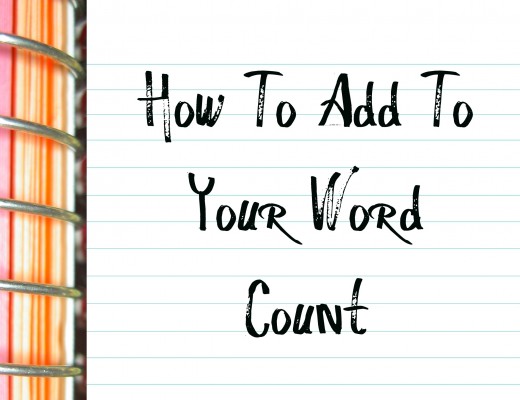Create Longer Posts & Assignments - How To Add To Your Word Count

We've all had those days. You come up with a great idea for an article, check your keywords, type it all in and smile at your hard work. Then you look at the word count - and see how dismal it actually is.
For google to actually notice your article or post and think it is of high enough quality to rank reasonably well, you need a minimum of at least 300+ words. If you want google to be even more impressed and rank high against a large base of competition, you need 1000-1500 words. However as Marisa Wright has mentioned, shorter articles can do well as long as they are interlinked (see Marisa's comment at the end of this article.)
Of course a whole range of things effects the chance of google ranking your post well including keywords, promotion and age as well as various other factors. However words, as the building blocks of your posts, do play a big part.
This is a guide for how to add some extras in your word count - without "spinning". Spinning basically means saying the same thing five times to increase your word count - and if your readers find you do this regularly, they won't come back for more.

Lists
Add some lists to your posts - tell people about the different varieties, types or styles available in relation to your topic. For instance, with an article about roses, you could provide a list of most popular types of rose varieties or different breeds of roses (such as cabbage, wild rose and modern).
Related Topics
Is there a particular related topic that may interest your reader? For instance a reader that is visiting your post about roses may be interested to know some quick gardening tips. Or on an article about cooking utensils you might be able to add some recipes.
Good and Bad
Writing an article about something controversial? Tell readers both sides of the story - even if you only support one side. As long as you make it clear to readers which side you support, they'll appreciate that you're partial enough to give them complete information.
Uses
Everything has a use - if it didn't you probably wouldn't be writing about it. Try making a list of various uses for it, from the mundane to the unique.
History
If you're writing about an item or destination, consider adding a bit of history. How did it start? Who was the creator? How has it improved since its creation or discovery?
Something that might interest the reader
You don't have to write specifically on the subject. If you're writing on something that has many parts and subtopics consider putting in some information your readers may be interested in - it may even spark another article idea!
- For a book review try adding a note about similar books and authors.
- For how to guides consider putting some tips about general maintenance and repair.
- For a story or poem try putting some background information about something in the piece of writing - such as the inspiration for it, the area it was set in or the characters.
Product, Item or Book review
Putting a short review of something related to your article can do two things.
- Add to your word count.
- Allow product placement and encourage your reader to click an amazon or ebay advert.
Recipes
Nope I'm not talking about just food recipes! You'll find that you can write a recipe on a lot of topics. Here are some examples:
- On an article about lemons - a recipe for lemon pie.
- On an article about engines - a recipe for making a makeshift part.
- On an article about flower colors that aren't available - a recipe to make white flowers into other colors with food dye.
- On an article about craft - a recipe for making a house out of paper and paddle pop sticks.
My experience
Many people find that it can be hard work to write an impartial article that gives all the pros and cons of a subject while still trying to convince the reader of their point or why they should buy an item.
Putting a small piece at the end of the article about your experiences with the topic will not only enforce the reader's belief that your background experience makes you a good source on the subject but will also give you a chance to explain some of your reasoning for liking the product or subject in greater detail.





